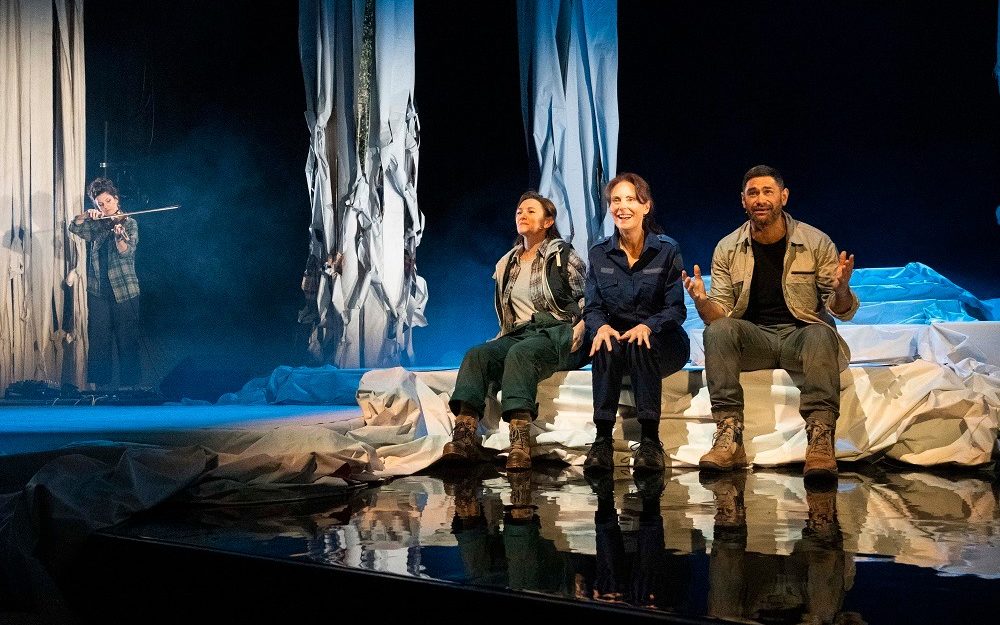Tasmania has, in recent years become the go-to destination for complex and atmospheric storytelling. Whether it’s the warm cuddle of the ABC’s Rosehaven, the disturbing black comedy of the same channel’s Bay of Fires, the into-the-middle-distance staring slow burn of Foxtel’s The Kettering Incident or the gloriously compelling nature of Prime Video’s Deadloch, it seems the small island to the south and slightly right of the mainland is the place to be, narratively speaking. It’s little surprise, then, that the trend continues in theatre.
Hells Gates, co-presented by the Space Company and the Geelong Arts Centre, told the story of a mass whale stranding (over 500 in fact) near Strahan in 2020 and the people who tried to save as many of these remarkable creatures as possible. With extensive research conducted on the Lands of the Palawa People (lutruwita/Tasmania), the production thankfully avoided an overly fact-laden or dogmatic documentary-style presentation of verbatim theatre.
The play blended the ramifications of the event itself with the reactions, responses and ongoing trauma to the humans who helped, and it did so with emotional heft and intellectual guidance. Drawn from original sources – townsfolk, emergency services, park rangers, fishers – and presenting the story of a multitude of characters through myriad lenses, the project attempted a lot in 60 minutes, and mostly succeeded.
Writer James Jackson (Paradise Lost, The Nose), director Katy Maudlin (Iphis, SLAP. BANG. KISS) and creative producer Joel Carnegie (Stardust) created a theatrical adventure that was equal parts funny, provocative, instructive and achingly sad. In the program notes Maudlin suggested that the story was ‘a compelling homage to community and human fortitude’. This idea shone through in a fast-paced narrative that asked us to contemplate the mystery of whale strandings and the majesty of humanity’s attempt to help, despite the overwhelming odds stacked against it.
The three actors (Louise Siversen, Natalie O’Donnell and Matu Ngaropo) played a variety of characters from salmon fish farmers to salty (pun intended) pub inhabitants, to magicians and tourists, and moved about the stage with ease, energy and in synchronisation. Siversen (Heartbreak Choir, House Husbands, Prisoner) was a standout as the hardened, but caring local cop unaccustomed to the responsibility wrought upon her by this almost unimaginable whale stranding event. She had audiences in the palm of her hand, simultaneously inviting us to laugh with her, cry with her, mock and muse with her.
O’Donnell (Come From Away, Next to Normal) gave a fine performance as a salmon fisherman worrying about his livelihood, while Ngropo (Hamilton the Musical, Australia and NZ) gave us a park ranger new to town, but no stranger to loneliness and insecurity. Counter-levering these performances was a live soundscape by musician Xani Kolac. This music was beyond haunting as Kolac’s electric violin sang, cried out and formed a heartbeat and the exquisite whale songs of the dying creatures.
These four consummate storytellers built interlaced physical and vocal patterns, working against and with one another to construct a narrative that was multilayered. At times, however, these patterns threatened to override the story as we watched rather than listened. The pace was sometimes too swift, not allowing us the time to sit with the writing, the imagery, the delicious verbal repetitions that needed and deserved to be savoured. The process seemed rushed in these moments. The characters seemed to be dispensed with too brashly, and the moving on to new characters too abrupt. The writing was sublime with more than a fleeting homage to magic realist tropes. Adding an extra 15 minutes to the running time would have given us permission to enjoy the journey more thoroughly.
The set, too, was difficult. Vast swathes of thick, white plastic were strewn around several levels. Large cylindrical shapes dropped from the ceiling. Of course, the metaphors of layers and shapes were obvious – representative of the whales they were attempting to save, the vastness of the landscape, the hopelessness of the task. Yet the characters did not interact with either. The cylindrical whales remained untouched, looming but sedentary. The thick plastic remained in place, aesthetically interesting but ultimately problematic. The actors became almost drowned by the largeness of it, on the world but not in the world.
Read: Dance review: The Other Side of Me, Darwin Festival
These quibbles aside, Hells Gates was a beautiful theatrical tale. It was global and personal, individual and political. It set a hopeful tone in the face of abject hopelessness and told a story steeped in texture, allegory and that old but resonating storytelling standby – the intricacies of the human condition.
Hells Gates was written by James Jackson and directed by Katy Maudlin
Presented by Space Company and Geelong Arts Centre
Creator/Producer: Joel Carnegie
Composer/Musician: Xani Kolac
Dramaturg: Tom Molyneux
Cultural Consultant: Trish Hodge
Set/Costume Design: Emily Collett
Lighting Designer: Richard Vabre
Sound Designer: Justin Gardam
Cast: Louise Siversen, Matu Ngaropo and Natalie O’Donnell
Hells Gates was performed at Geelong Arts Centre from 10-12 August; tickets $44-49.
This review is published under the Amplify Collective, an initiative supported by The Walkley Foundation and made possible through funding from the Meta Australian News Fund.





